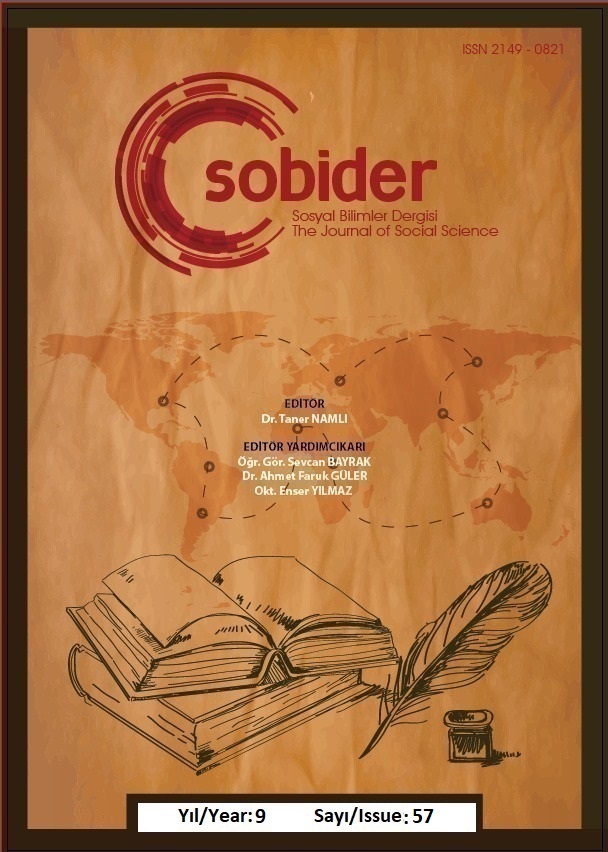OSMANLI SİYASAL HAYATINDAKİ KÖKLERİ BAĞLAMINDA 27 MAYIS 1960 VE 12 EYLÜL 1980 DARBELERİ ÜZERİNE BİR DEĞERLENDİRME
Author :
Abstract
Siyasal kültür, siyasal sistemin ötesinde yerleşik temayüllere ve tarihi tecrübelerin birikimine dayanmaktadır. Yaşanılan siyasi dinamizm hem siyasetçilerin hem de seçmenlerin zihninde ve pratiğinde yerleşik hale gelerek bilinçli veya bilinçsiz bir şekilde söylemlere ve politikalara yansır. Türkiye Cumhuriyeti’nde yaşanılan darbeler de bu şekilde Türkiye siyasi hayatında siyasal kültürün inşa edilmesinde önemli bir yere sahiptir. Bu bağlamda, Türkiye’deki 27 Mayıs 1960 ve 12 Eylül 1980 darbeleri siyasal kültür açısından ele alınmış, psikolojik ve meşrulaştıran söylemlerin siyasal kültürdeki yeri ve etkisi irdelenmiştir. Bu çalışmada siyasal kültürün darbeleri meşrulaştırmadaki fonksiyonuna ve darbelerin siyasal kültürün devinimine etkisi karşılıklı olarak incelenmeye çalışılmıştır. Her iki darbenin siyasal kültür ile karşılıklı etkileşimine bakılarak 1980 askeri darbesi siyasal kültür merceği ile değerlendirilmiştir.
Keywords
Abstract
Political culture is based on established tendencies beyond the political system and the accumulation of historical experiences. The political dynamism experienced becomes entrenched in the minds and practices of both politicians and voters and is reflected in discourses and policies, consciously or unconsciously. In this way, the coups experienced in the Republic of Turkey have an important place in the construction of political culture in Turkish political life. In this context, the 27 May 1960 and 12 September 1980 coups in Turkey were discussed in terms of political culture, and the place and effect of psychological and legitimating discourses in political culture were examined. In this study, the function of political culture in legitimizing coups and the effect of coups on the movement of political culture have been tried to be examined mutually. Looking at the mutual interaction of both coups with political culture, the 1980 military coup was evaluated with the lens of political culture.
Keywords
- Ahmad, F. (2015). Demokrasi Sürecinde Türkiye. İstanbul: Hil Yayınları.
- Ahmad, F. (2020). Modern Türkiye'nin Oluşumu. İstanbul: Kaynak Yayınları.
- Akıncı, A. (2013a). "Türkiye'de Askeri Vesayetin Tesisi ve Demokratikleşmeye Olan Etkisi". Akademik İncelemeler Dergisi, 8 (1), 93-123.
- Akıncı, A. (2013b). "Türk Siyasal Hayatında 1980 Sonrası Darbeler ve E-Muhtıra". Trakya Üniversitesi Sosyal Bilimler Dergisi, 15(2), 39-58.
- Biçer, S. (2017). "27 Mayıs 1960 Askeri Darbesi ve Sonrasındaki Askeri Müdahaleler ile 15 Temmuz 2016 Darbe Girişiminin Sebep, Sonuç, Planlama ve İcralarının Mukayeseli Analizi". Bilge Strateji, 9 (17), 13-31.
- Bilgi, L. (2017). "27 Mayıs ve 12 Mart Darbe Romanları". Abdullah Ekinci (ed), İslam Tarihinin İlk Asrından Günümüze Darbelerin Tarihi (ss. 177-187). Şanlıurfa: Urfa Okulu Yayınları.
- Coskun, Y. (2016). "İngiliz Belgelerinde 12 Eylül Süreci". Uluslararası Sosyal Araştırmalar Dergisi, 9 (42), 530-535.
- Çetinkaya, S. G. (2020). "Adnan Menderes'in Siyasal Karakteri ve 27 Mayıs". Journel Of Universal History Studies, 3, 112-130.
- Danış, Ö. F. (2019). 27 Mayıs 1960 Darbesinin Seçkin Kurumları Doğrultusunda İncelenmesi. (Yayımlanmamış Yüksek Lisans Tezi). Ankara: Yıldırım Beyazıt Üniversitesi Sosyal Bilimler Enstitüsü.
- Demir, Ş. (2017). "Demokrat Parti ve 27 Mayıs Askeri Darbesi". Abdullah Ekinci (ed), İslam Tarihinin İlk Asrından Günümüze Darbeler Tarihi (ss. 142-156). Şanlıurfa: Urfa Okulu Yayınları.
- Erdem, T. (2021). Stratejik Düşünce Enstitüsü. 15 Haziran, 2021 tarihinde Stratejik Düşünce Enstitüsü Web Sitesi: https://www.sde.org.tr/tevfik-erdem/genel/sapka-ve-28-subatkose-yazisi-21248 adresinden alındı. (Erişim Tarihi :15.06.2021).
- Eser, G. (2017). "İngiliz Basınıda Albay Talat Aydemir'in Darbe Girişimleri". Abdullah Ekinci (ed), İslam Tarihinin İlk Asrından Günümüze Darbeler Tarihi (ss. 159-175). Şanlıurfa: Urfa Okulu Yayınları.
- Heper, M. (2018). Türkiye'de Devlet Geleneği. Ankara: Doğu Batı Yayınları.
- Kırkpınar, D. (2009). 12 Eylül Askeri Darbesi'nin Gençliğin Üzerindeki Etkileri. (Yayımlanmamış Yüksek Lisans Tezi). İzmir: Dokuz Eylül Üniversitesi Atatürk İlkeleri ve İnkılap Tarihi Enstitüsü.
- Mahçupyan, E. (1996). “Askeri Otorite’nin Kurumsallaşmasına ve Zihniyetine Dair”. Köprü Dergisi, No: 56 (Güz), 20-29.
- Nazlı, A. (2017). “Darbeler Anayasalar ve Toplumsal Sözleşme”. Abdullah Ekinci (ed), İslam Tarihinin İlk Asrından Günümüze Darbeler Tarihi (ss. 40-49). Şanlıurfa: Urfa Okulu
- Öztürk, M. M. (2020). Cumhuriyet Dönemi Askeri Müdahalelerin Türkiye'nin Demokratikleşme Sürecine Etkisi. (Yayımlanmamış Doktora Tezi). İstanbul: İstanbul Gelişim Üniversitesi Sosyal Bilimler Enstitüsü.
- Şehirli, Y. A. (2018). "Okul Öncesi Öğretmen Adaylarının Darbe Kavramına İlişkin Metaforik Algıları". Sosyal Bilimler Araştırma Dergisi, 7 (4), 134-148.
- Tanık, İ. H. (2017). "Asırlık Bir Yaşam Öyküsü; Celal Bayar". Abdullah Ekinci (ed), İslam Tarihinin İlk Asrından Günümüze Darbeler Tarihi (ss. 198-209). Şanlıurfa: Urfa Okulu Yayınları.
- Tatlıoğlu, K., Gözütok, A., & Uysal, M. (2017). "Türkiye'de Askeri Darbelerin Psiko-Sosyal, Ekonomik ve Politik Sonuçları Üzerine Genel Bir Değerlendirme". Kartepe Zirvesi 2017 Uluslararası 15 Temmuz ve Darbeler Küresel Etkiler, Medya ve Demokrasi Sempozyumu Tebliğler Kitabı (ss. 277-297). Kocaeli: Kocaeli Büyükşehir Belediyesi.
- Tunç, O. (1996). “Ordu ve Siyaset”. Köprü Dergisi, No: 56 (Güz), 12-17.
- 1961 Türkiye Anayasa Referandumu https://tr.wikipedia.org/wiki/1961_T%C3%BCrkiye_anayasa_referandumu (Erişim Tarihi : 06.06.2021).
- (https://www.tdk.gov.tr/, Erişim Tarihi, 01.06.2021).





